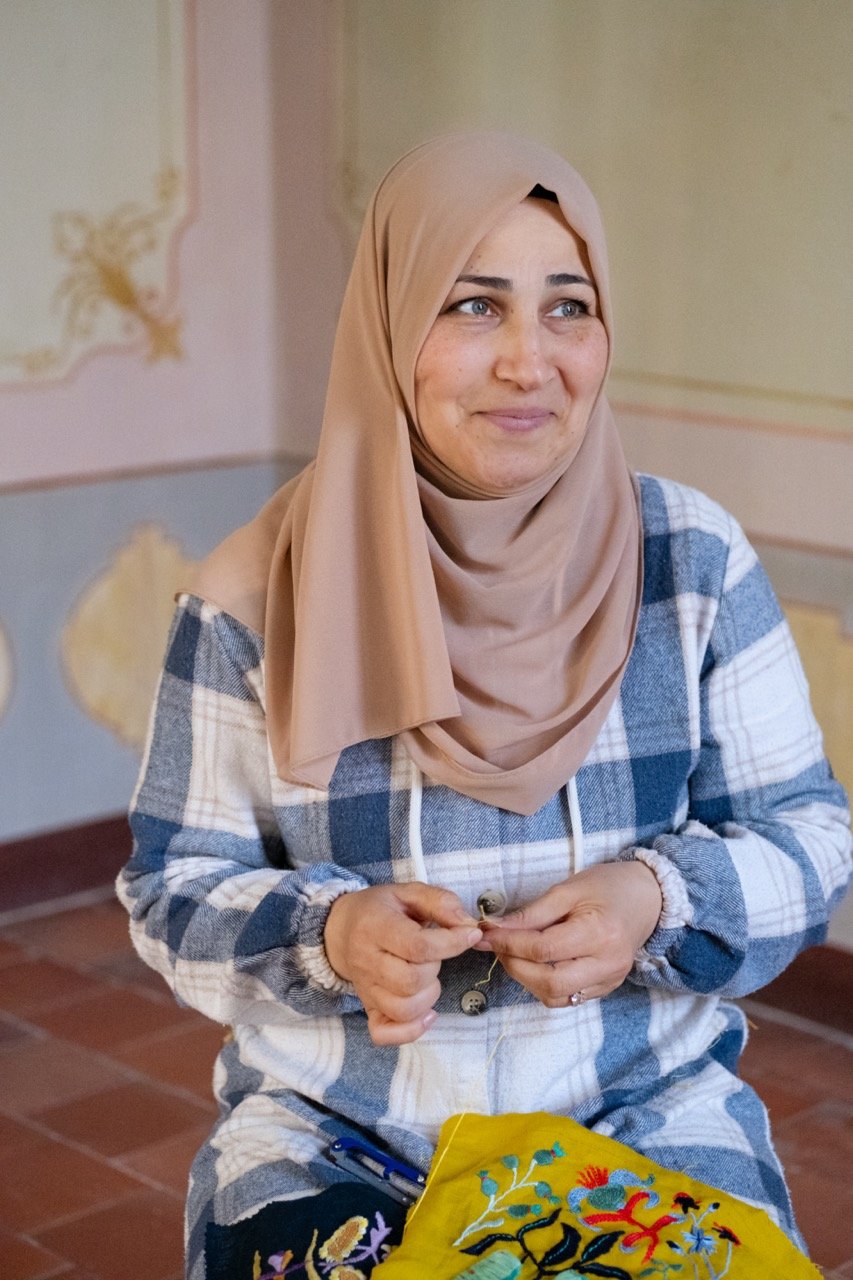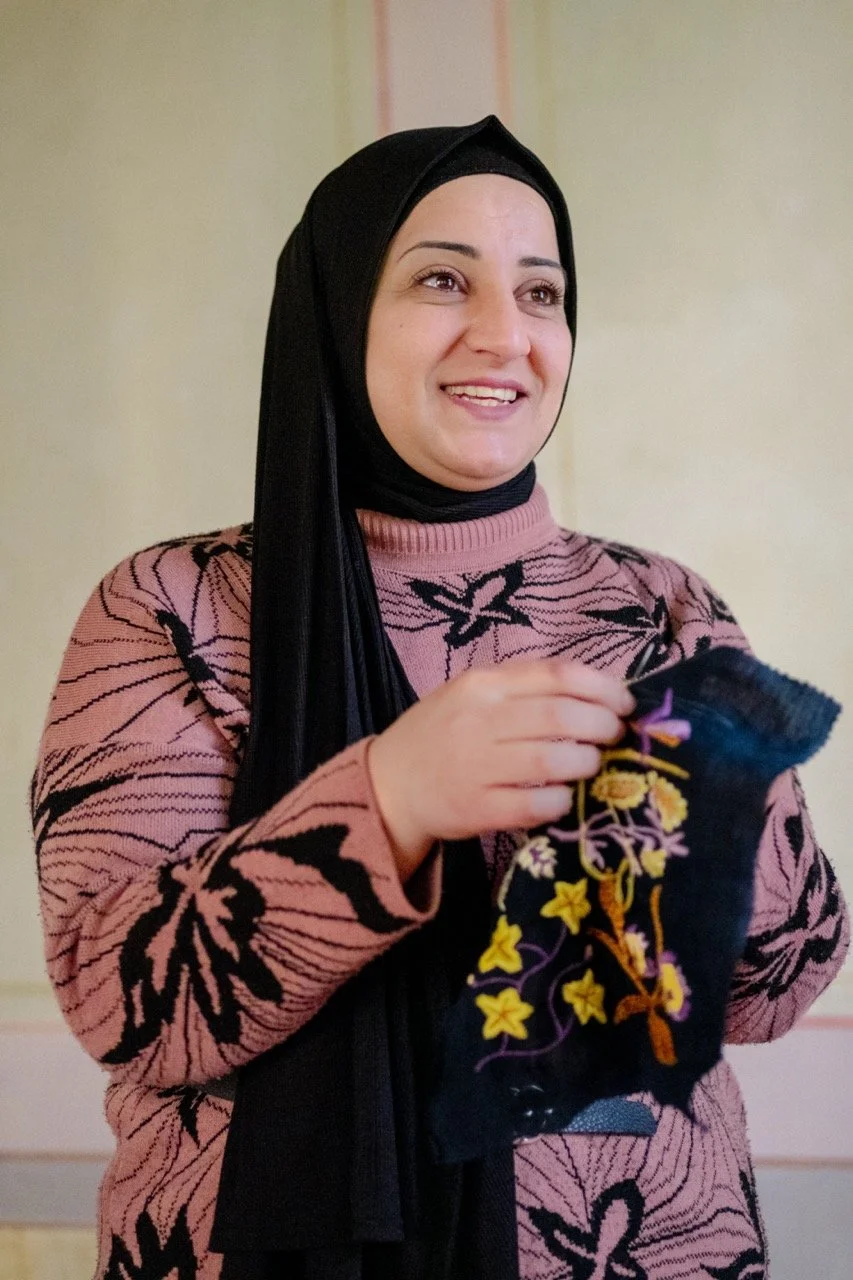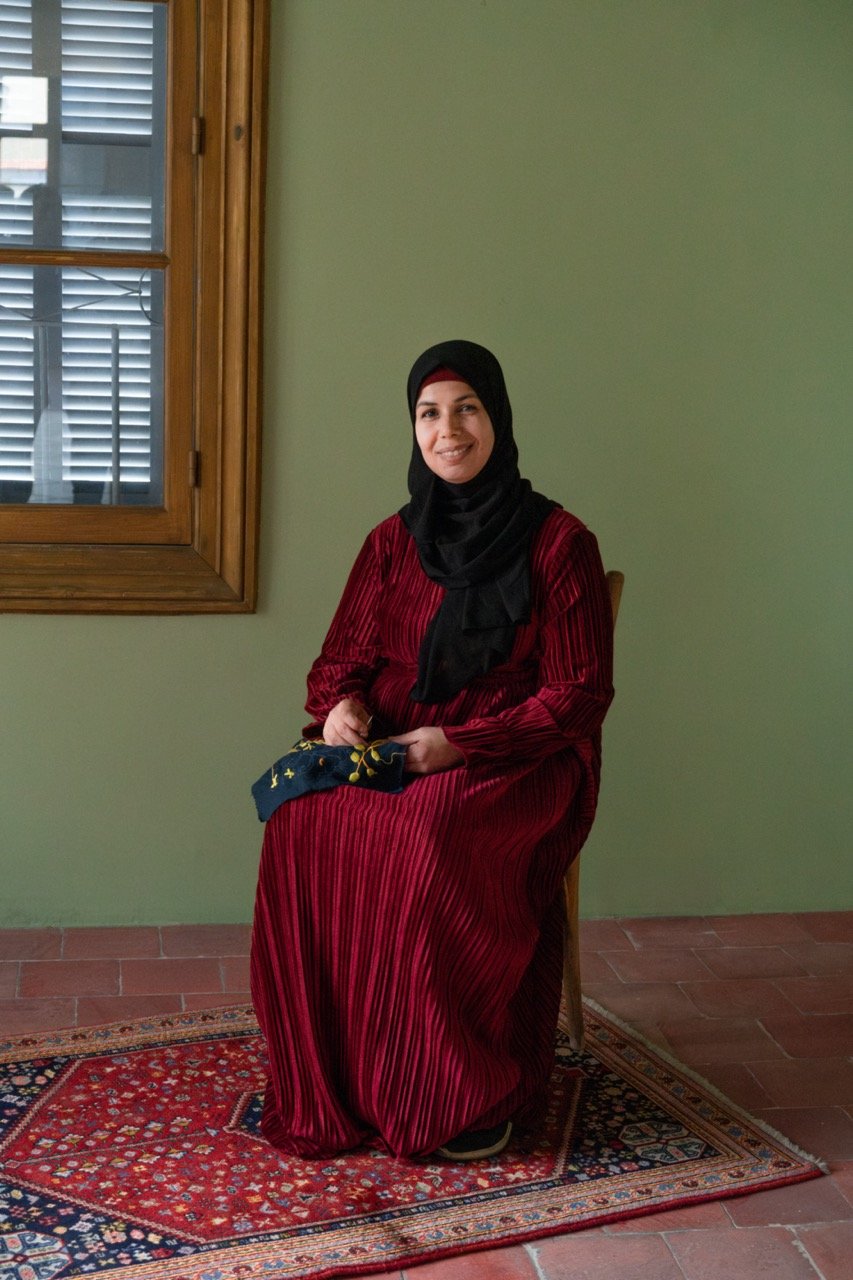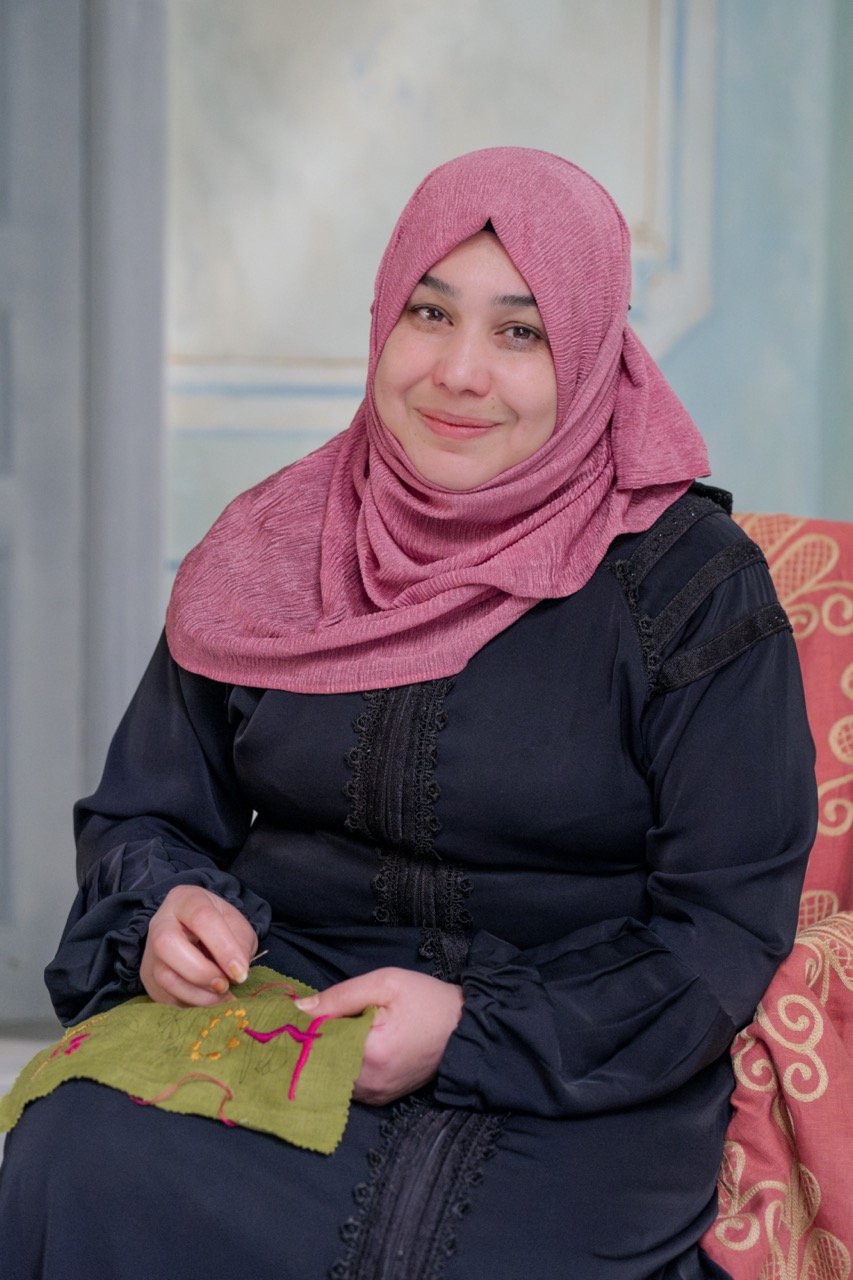A collaboration with Morris & Co. and The Fabled Thread: art and crafts come full circle
‘A rather exciting project’
About a year ago we received an email from Eppie Thompson at The Fabled Thread about ‘a rather exciting project’.
We have known Eppie for a while now, and if she says something is exciting, you know it really will be. This, after all, is a woman who founded her own start-up in the midst of covid, with a mission to empower everyone to explore and express their own creativity - first through embroidery kits, but now also through decorative painting, creative courses, and a studio membership full of inspiring content and ideas. She even embroidered her own wedding dress…
When we jumped on a call to discuss this particular project, we were not disappointed. Eppie explained that she had received a proposal from the iconic Morris & Co. inviting her to collaborate on creating 30 one-of-a-kind pieces to celebrate the launch of their Bedford Park collection.
Bedford Park and William Morris
As Eppie says: ‘Bedford Park in Chiswick, once the heart of the Garden Suburb Movement, became a revolutionary centre for design through design visionaries like William Morris, C.F.A. Voysey, Allan Francis Vigers, and J.H. Dearle. Together, they shaped Arts & Crafts design, blending nature’s influence with craftsmanship. Morris & Co.'s Bedford Park collection honours this legacy, reviving iconic patterns with a bold, disruptive palette of rich, gem-like colours.’
For those of you familiar with The Fabled Thread’s instagram account, Eppie’s first home’s hallway was papered in Morris’s Willow Boughs, so for more than one reason this was a dream come true, apart from one thing: embroidering 30 one-of-a-kind pieces is no small undertaking, especially for a person already running their own busy start-up.
That is why Eppie had reached out to us. Would the Oshana refugee embroidery artisans be interested in hand-stitching the designs? Well of course we would!
The creative process
Eppie wanted the designs to be ‘bold and brimming with colour—not necessarily true-to-life hues but vivid, expressive shades that match the playful spirit of the Bedford Park collection’ and to capture the spirit of Morris’s work ‘in a new embroidered form.’ From this starting point, she played with colour palettes and nature motifs until she had nine designs that felt true to her own aesthetic while also embedded in Morris’s originals.
Head over to Eppie’s blog for an in-depth description of the design process - for anyone interested in creativity this is a fascinating must-read (make sure you scroll right to the bottom and don’t miss the note on her incredible hand-painted frames!).
Hand-stitched by Oshana’s refugee artisan women in Lebanon
We got involved at the point where the designs were finished and ready to be sent to Lebanon and individually stitched by our artisans. Eppie went to huge effort to provide us with everything we needed to produce perfect pieces, from a fully stitched sample of each design, along with mini-kits to demonstrate every colour choice and stitch style.
Our artisans spent the summer stitching, and absolutely loved working on these designs.
It was a way for women who have been forced to leave their homeland to use the embroidery skills they learned from their mothers and grandmothers back in Syria - a way to connect with home.
It was a way to engage in the meditative, mindful process of slowly stitching, each pull of the thread calming for women who have lived through unimaginable trauma.
And it was a way to earn an independent living and support their children despite the very difficult circumstances for refugees in Lebanon.
Last but not least, as women mostly from the countryside now living in the urban slums that are the refugee camps of southern Beirut, it was a way to delight in flowers and foliage, as all of the designs are inspired by nature - in line with Morris’s original aesthetic philosophy.
Coming full circle
William Morris was also inspired by the line and form of traditional Islamic art, including Ottoman ceramics and Persian carpets. He was a social reformer and activist who was deeply troubled by poverty and injustice, as well as being an advocate for craft and craftsmanship.
There is something deeply satisfying about seeing all this come full circle through this beautiful collaboration.
These pieces were a one-off for Morris & Co. to celebrate the launch of their Bedford Park collection, and therefore aren’t available for sale. However, we cannot overstate what this project has meant to us and our artisans.
Our huge gratitude to Morris & Co. and to Eppie and The Fabled Thread, for the chance to work on this gorgeous project, which has felt so meaningful to us in so many ways. Thank you.
Read on below to find the stories of some of the Oshana artisans who stitched the pieces..
Fayrouz Awad
“I am Fayrouz Awad, a Syrian resident in Lebanon. My home in the village was filled with the beauty of my handmade crafts that adorned the walls and furniture, and with plants and flowers that instilled joy and tranquillity, especially since I used to spend time at home with my young children, being both their mother and father due to their father's continuous travel.
Then came the war that forced us to leave the house, which was shelled from all sides. I fled with my children to Beirut, where my elder son was working. The situation was very difficult, but I used to tell myself that my feeling of alienation was easier for me than losing one of my children.
Nevertheless, I lost my son, a young man of twenty years, just one week before his wedding in a car accident. I mourned and fell into depression, and the world became dark in my eyes. The hardest feeling is when you lose a piece of your heart.
I remained in this state for a year until I found an opportunity to return to my favourite work, embroidery, which used to make me forget my worries and sadness. I found my place in Oshana, where I formed friendships like no other and found mental comfort and released the buried negative energy within me. Thank God, I proved my competence and skill in embroidery and became the supervisor of embroidery, which provided me with a golden opportunity to enrol my daughters in a good school and help my family in difficult circumstances.
I have become much better psychologically, socially, and economically. I love this centre and everyone who works there, and when I meet with the workers, I feel like I'm among my family, from whom I have been separated. When I am among them, I feel like I am among my own people.”
Fatima Ali Omar
“I am Fatima Ali Amr, from Syria, from Idlib. The conditions of the war forced us to flee our country. Our house was destroyed, and my husband’s work too. There was nothing left for us; there was no income, no security, no life even.
We left our home, and moved around a lot staying here and there, but always the war would follow. In the end we came to Lebanon. But the conditions here in Lebanon are almost as bad as they were in Syria. We thought we might have to go back to Syria because we didn’t have any money, and life in Lebanon is so expensive. We were all living in one room, with four children. It was like a grave, it had no light. We were living in a nightmare.
Then I met the Oshana team and I started working with them, going out, and socialising. I made friends. I helped my husband with the rent so we got better accommodation where we can see the sun. I became healthier, thank God. I am more confident in myself. I have friends and people who love me and whom I love. I have indeed found my place. I really love doing embroidery, I work it from my heart. Embroidery reminds me of home.
There is a certain stitch that my mum taught me when I was young. Where I’m from in Syria the bride has to provide the linen for her new home, so everyone makes the sheets and pillows and tablecloths and everything by hand. You will be highly regarded if you know how to embroider and make these beautiful things.”
Nadia Al Sheikh
“My name is Nadia Al Sheikh, and I am originally from Idlib, Syria. In 2016, amidst growing turmoil, I fled to Beirut with my three children, seeking refuge and a new beginning. Life in Beirut was isolating at first; I knew no one and the loneliness was unbearable.
Everything changed when my neighbour introduced me to Oshana. Joining Oshana was a turning point—suddenly, I wasn't just surviving; I was thriving. The project not only brought friends into my life but also lifted my spirits. Our weekly meetings at the centre became the highlight of my week, a place that felt as welcoming and warm as home.
Oshana has truly become my family in Lebanon. It's through this work that I've managed to enrol my daughters in a good nursery, support my husband, and meet our family's needs. This job has given me a sense of accomplishment and added flavour to my life. Though my background is in music, embroidery has captured my heart. Each stitch I make is a testament to my resilience, a way to wield beauty against life's challenges.”
Jamila Al Rashid
"I am Jamila Al Rashid. I left Syria in 2011 at the beginning of the revolution when the army entered and there were clashes and raids on houses. We fled to Lebanon and since then I haven't returned to Syria.
Our situation was very difficult and bad until my friends introduced me to Oshana. I have been working with them for three years now. I have made friends and found another family, and I'm very happy during gatherings with them.
The most important thing is that now I have an income to help buy our children what they need.
I am very happy with my work; it's what helps me forget my worries, and at the same time, I feel like I'm doing something important. Oshana is my place."
Hiyam Safouk
“I left Syria in 2017 after my house was bombed and I lost my husband. In Lebanon I participated in a workshop where I learned embroidery. I started looking for places that offer work as the situation is very difficult.
Then I met Oshana through a girl who used to work with then, and I started working there. Thank God, the centre is amazing and the treatment is wonderful, they treat us like sisters.
Through this work, I can buy my children clothes and good food. I really enjoy the meetings at the centre, they make me feel happy.”
Bushra Al Ahmad
“My name is Bushra Al Ahmad. I fled Syria in 2013 to escape the war, finding refuge in Lebanon. It was there, a few years later, that I met the Oshana team—an encounter that profoundly transformed my life.
Working with them has not only bolstered my mental health but also granted me financial independence. Now, I can provide for my children's needs, which has been immensely empowering.
More than just a means to an end, this job has reinstated my sense of worth in society, beyond the confines of household duties.
It has rekindled my spirit, connecting me with friends and a community that values me. It made me feel alive again.”














